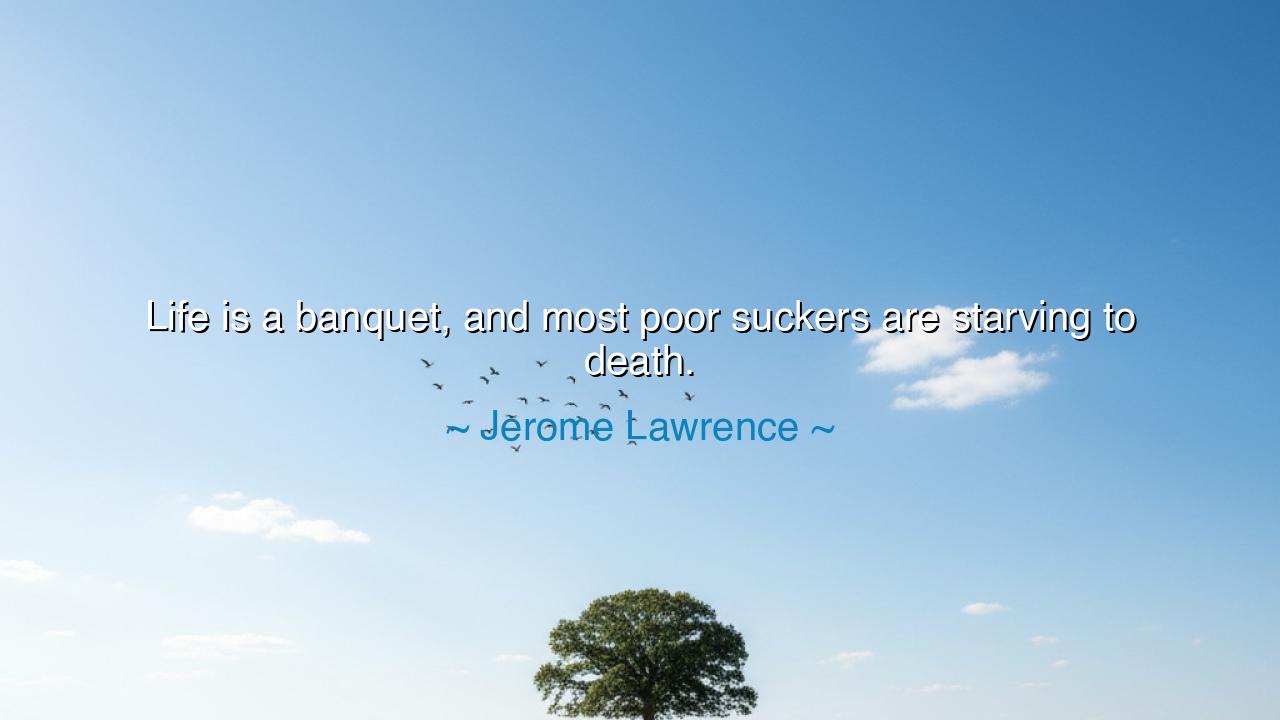
Life is a banquet, and most poor suckers are starving to death.






“Life is a banquet, and most poor suckers are starving to death.” — thus wrote Jerome Lawrence, the playwright whose words shimmer with irony and truth, reminding us that the feast of existence lies open before us, yet most of humanity passes by its table unfed. In this sharp and luminous declaration, Lawrence speaks not of hunger of the body, but of the hunger of the soul — a famine of awareness, courage, and joy. His words are both a rebuke and a blessing: a rebuke to those who move through life half-asleep, blind to its beauty; and a blessing to those who dare to awaken, to taste, to live. For the banquet is not hidden — it is life itself, overflowing with richness, wonder, and peril. Only the fearful and the numb go hungry.
The origin of this quote reaches beyond the page. It comes from Auntie Mame, a play written by Jerome Lawrence and Robert E. Lee, first performed in 1956. The line is spoken by the character Mame Dennis, a woman of boundless vitality, who embraces life with reckless joy and compassion. Her words, both humorous and profound, became a rallying cry against conformity and timidity in an age of postwar caution. “Life is a banquet,” she cries, “and most poor suckers are starving to death!” The line is theatrical, yes — but beneath its laughter lies ancient wisdom: that life is abundant, and that it is not the world that withholds joy from us, but we who withhold ourselves from it.
The ancients would have understood her well. The Stoics taught that nature gives us everything we need to live well — yet we squander it through fear, greed, and ignorance. The Greek poets compared life to a feast of the gods, from which mortals often turn away in pride or despair. And the Eastern sages, too, warned that the blind chase for possessions blinds the heart to the true banquet — the banquet of presence, compassion, and wonder. Lawrence, through his character, speaks in their tradition: he calls us to wake from our self-imposed poverty, to reclaim the joy that has always been our inheritance.
To understand this truth, consider the story of Helen Keller. Stricken blind and deaf at nineteen months old, she lived for years in darkness and silence, locked within herself. Yet when her teacher, Anne Sullivan, taught her the language of touch, Helen awakened to a world she had never seen. She wrote later, “I who am blind can give one hint to those who see — use your eyes as if tomorrow you would be stricken blind.” In that sentence lives the same spirit as Lawrence’s: the world is overflowing with light, sound, love, and meaning — and yet most of us, though we have all our senses, do not truly see, hear, or feel. We live as beggars in the midst of plenty, starving while the feast lies before us.
The banquet of life is not made of luxury or comfort; it is composed of moments — fleeting, fragile, divine. The taste of fruit, the sound of laughter, the tenderness of a child’s hand, the courage to dream, the peace of forgiveness — these are the dishes set upon the table. Yet how often do we turn away from them in pursuit of lesser hungers? How often do we trade wonder for convenience, silence for noise, presence for distraction? We are surrounded by abundance and yet live as though we are impoverished, mistaking existence for living. Mame’s cry — and Lawrence’s — is the ancient call to awaken, to feast upon life while it lasts, for the banquet will not last forever.
There is also a moral fire in this quote — a call to responsibility. For to live fully is not merely to consume the feast, but to share it. The one who truly sees the richness of life cannot hoard it. Like Mame Dennis, who opened her home to orphans, artists, and dreamers, the awakened soul becomes a host at the banquet, inviting others to the table. To live fully, then, is not to indulge selfishly, but to live expansively — to love, to give, to create, to savor, and to uplift. For the banquet of life grows richer the more we share it.
Therefore, O listener of tomorrow, heed this teaching: do not starve in the midst of abundance. The feast is here — in your breath, your work, your relationships, your moments of quiet awe. Refuse to live halfheartedly. Refuse the gray comfort of safety. Taste life — even when it burns, even when it wounds — for that is where its flavor lies. The gods have set the table; the earth itself is the banquet hall. Come, then, and eat. Drink from the cup of joy, break bread with courage and compassion, and leave this world not hungry, but nourished in spirit. For as Jerome Lawrence reminds us, life is a banquet — and to live is to feast upon it with gratitude, boldness, and wonder.






AAdministratorAdministrator
Welcome, honored guests. Please leave a comment, we will respond soon